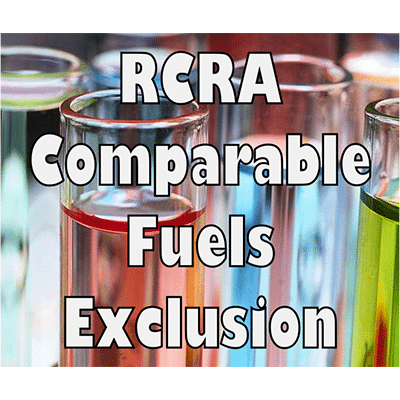
Written by: Angie Martin, PE CHMM & Jim Brossman, Senior Consultant
According to the EPA, “”On June 27, 2014, the United States Court of Appeals vacated the ‘Comparable Fuels Rule’, which provided an exclusion from RCRA hazardous waste regulations for certain fuels derived from hazardous waste. EPA, recognizing the potential impact of this decision, has filed a motion with the court requesting a 30-day delay in the effective date of the decision (currently scheduled for August 11, 2014, absent petitions for appeal or rehearing) in order to gather information to help plan for orderly transition consistent with the opinion. At the end of that time, EPA may seek a further stay of the mandate if it determines that additional time is necessary for facilities to come into compliance with the applicable requirements.”
Update: On August 7, 2014, the court granted a stay of the mandate through September 17, 2014.
We expect to see a notice in the Federal Register very soon withdrawing the rule (40 CFR 261.4(a)(16) and 261.38). States are expected to follow so as not to be less stringent than the federal government. Generators using this exemption will need to do a proper waste determination on wastes and possibly will need to ship wastes that were being burned onsite to an off-site Resource Conservation and Recovery Act (RCRA) permitted facility (TSD) — presumably incinerator or supplemental fuel/cement kiln.
What was the Comparable Fuels Exemption?
The comparable fuels exclusion was an exemption only available for liquids that met the comparable fuels specifications for BTU value, viscosity, and maximum hazardous constituent concentration. Materials that met the specifications would not be solid wastes (and therefore not hazardous wastes) if burned in an industrial furnace, utility boiler or hazardous waste incinerator.
The types of materials EPA thought would meet the terms of the exclusion included alcohols, oils, and other organic liquid wastes. In addition to BTU and viscosity requirements, there were hazardous constituent concentration limits for over 200 compounds included in the exclusion. The standard for most of these constituents was non-detection.
Due to the low specifications, and restrictions on blending to meet most specifications, the types of facilities that claimed the exemption were usually pharmaceutical manufacturers or other facilities that generated large volumes of lightly contaminated spent solvents which they typically wanted to burn in an on-site boiler. Although it was self-implementing, general market knowledge indicated that few facilities attempted to qualify for this exclusion due to the low constituent standards and the analytical burden required to demonstrate compliance.
Does this affect other fuel type exclusions?
No. Fuel-for-fuel and Used Oil exclusions are still in effect as before.
This decision does not appear to impact the reclamation and reuse of off-specification fuels since those materials are not solid wastes (or hazardous wastes) when destined for recovery and reuse as fuel.
What does this mean for generators?
If you are a generator who has been using this exemption, it may be time to consider performing a new proper waste determination and a review of your disposal arrangements. Be sure to include a review of compliance concerns regarding tanks that were product tanks becoming waste accumulation tanks. Don’t hesitate to seek environmental compliance help if you are unsure of the specific implications for your materials and facilities.
For further information on this subject visit the EPA’s webpage on the Comparable Fuels Rule.
If you believe that you may be using this exemption, Heritage can assist you in making a proper waste determination, disposal arrangements, as well as compliance consulting regarding a potential change in generator status or tanks that were product tanks becoming waste accumulation tanks. Contact a Heritage Representative today.
More News From Heritage
-
1/7/25
Navigating e-Manifest: What You Need to Know About Hazardous Waste Compliance
Learn about the e-Manifest Third Rule changes that begin January 22, 2025
-
12/23/24
Wreaths Across America 2024
This year, through collective effort and heartfelt generosity, we sponsored 727 wreaths and transported two truckloads of wreaths across the country.
-
12/2/24
Heritage Environmental Services Announces Rachel Evans as Chief Human Resources Officer
Heritage Environmental Services announced today that Rachel Evans will join the organization as Chief Human Resources Officer.
-
11/26/24
Honoring Teresa Wade: A Legacy of Dedication to Wreaths Across America
Celebrate Teresa Wade's legacy at Heritage Environmental and her dedication to Wreaths Across America. Learn her story and how you can honor veterans
-
11/14/24
Bright Futures Begin Lead-Free: Reducing Lead Exposure Together
Learn about lead decontamination, disposal processes, and join us in creating a lead-free future.
-
11/11/24
Celebrating Our Veterans at Heritage Environmental Services
-
10/31/24
Heritage Environmental Services Secures Commercial Permit Status for Orange, TX Incinerator
Learn more about Heritage Environmental Services securing a commercial permit for its Orange, TX incinerator, expanding waste disposal solutions.
-
10/14/24
Heritage Environmental Services Announces Timothy Thomas as Chief Operating Officer
Heritage Environmental Services (“HES”), an EQT Infrastructure portfolio company, announced today that Timothy Thomas will join the organization as Ch








